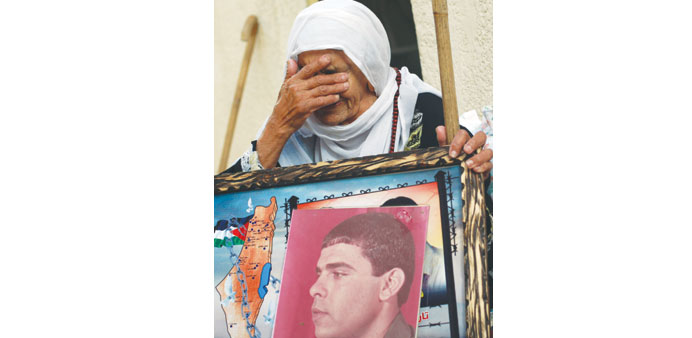The mother of Palestinian Fares Baroud, who has been held in an Israeli prison for 22 years, cries as she holds his picture after hearing news of his possible release at her house in Shati refugee camp in Gaza City yesterday.
AFP/Jerusalem
The government yesterday approved the contentious release of long-serving Palestinian and Israeli Arab prisoners, reportedly including some with Israeli blood on their hands, to coincide with renewed peace talks, public radio said.
It said the 22-member cabinet approved Prime Minister Benjamin Netanyahu’s proposal to free prisoners by a vote of 13 in favour, seven against and two abstentions.
In an open letter published on his official Facebook site on Saturday, Netanyahu said he had agreed “to free 104 Palestinians in stages, after the start of negotiations and according to progress” and that he would seek cabinet endorsement.
His office said in a statement yesterday that the cabinet also approved peace talks with the Palestinians brokered by the US but without elaborating where or when.
The statement, however, did not announce that a prisoner release had been approved, only mentioning the formation of a committee on the issue.
“The government approved the opening of negotiations between Israel and the Palestinians... and mandated a ministerial committee for the release of prisoners during the course of the talks,” it said.
A Palestinian official said on Saturday that peace talks, stalled since September 2010, would open in Washington tomorrow.
The chief Palestinian negotiator lauded the Israeli vote on prisoners.
“We welcome the Israeli government’s decision to release the prisoners,” Saeb Erakat said. “We consider this an important step and hope to be able to seize the opportunity provided by the American administration’s efforts.”
The start of yesterday’s cabinet meeting was delayed for over an hour, as Israeli media said Netanyahu sought to win over opponents within his own right-wing Likud party.
While the names of the prisoners have yet to be officially published, or even revealed to ministers, they reportedly include militants convicted of killing Israeli women and children or of killing Palestinians suspected of collaborating with Israel.
“This moment is not easy for me, not easy for the ministers, and especially not easy for the bereaved families,” Netanyahu’s office quoted him as telling ministers at the start of the meeting.
The planned releases have stirred protests from Israeli victims’ families, settlers and Netanyahu’s hardline coalition partners.
“Releasing terrorists for peace is like trying to put out a fire with gasoline. It is dangerous, immoral and irresponsible,” settler leader Dani Dayan said in a statement.
Likud deputy defence minister Danny Danon urged the party’s ministers to vote “no”.
“I say that this is a diplomatic mistake, a moral mistake,’ he told public radio.
French Foreign Minister Fabius hailed the planned resumption of talks.
“I welcome this potentially major step forward which comes after a three-year hiatus and I wish that these negotiations manage to result in an agreement,” Fabius said yesterday.
Ahead of the talks, the Israeli cabinet has also approved an “urgent and important” bill which would require a referendum for a peace treaty in some circumstances.
A cabinet briefing paper said the government would ask parliament to fast-track its passage into law.
If adopted, the bill would oblige a referendum in cases where territory over which Israel claims sovereignty is ceded in a peace agreement or by a cabinet decision.
While a plebiscite would not be a requirement in the case of Israeli withdrawal from the rest of the West Bank, it would apply to changes in any part of mainly-Arab East Jerusalem, which Israel occupied in the 1967 Six-Day War and annexed in a move never recognised by the international community.
The Palestinians claim East Jerusalem for the capital of their own promised state. Israel rules out ceding sovereignty over any part of what it calls its “eternal and indivisible capital”.
Qadura Fares, head of the Palestinian Prisoners’ Club which tracks the treatment of Palestinians in Israeli jails, warned yesterday there would be no peace talks unless all 104 prisoners returned to their homes.
“If they don’t free all of them, there will be no negotiations,” he told public radio.

